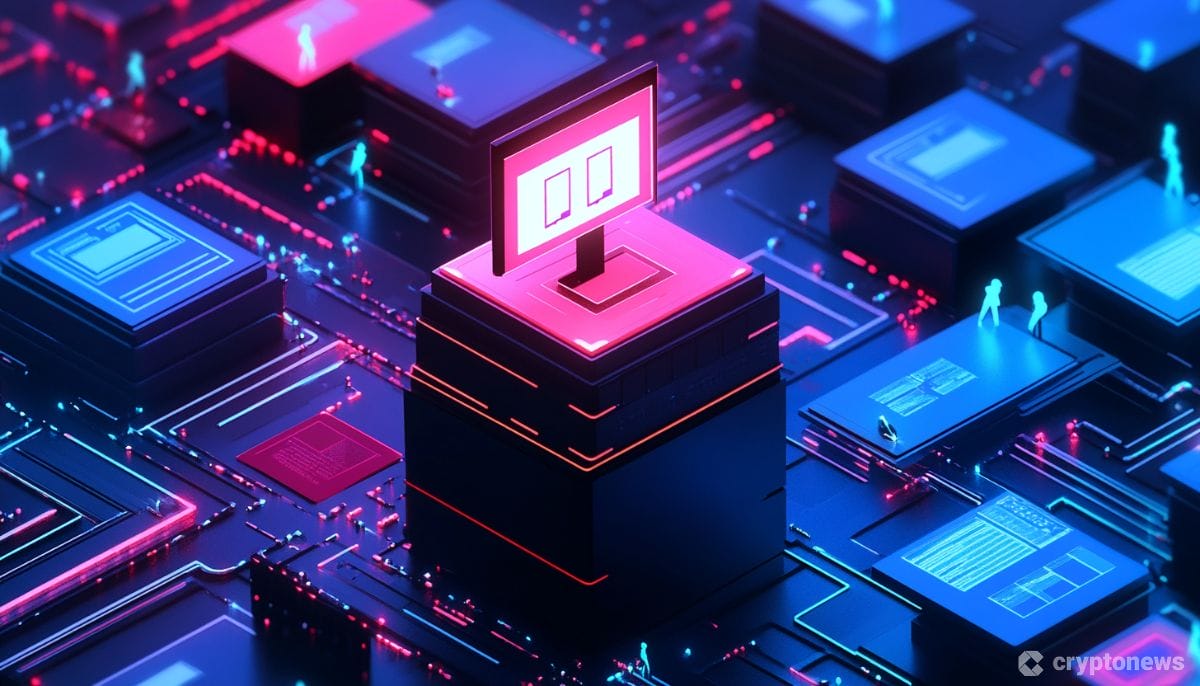Last updated:
 Why Trust Cryptonews
Why Trust Cryptonews

This year is one of the most notable for elections, as more than 100 countries from around the world will vote in 2024.
Yet the rise of artificial intelligence (AI) and online disinformation has resulted in a less trustworthy voting system.
These challenges are impacting traditional voting methods, such as vote-by-mail systems.
Following the recently concluded 2024 elections, a poll by the Public Affairs Council reveals that only 37% of Americans believed the elections would be honest and transparent.
Blockchain Voting Gains Momentum in the Electronic Voting System Market
As confidence in traditional voting methods wanes, electronic voting systems, especially those incorporating blockchain, are emerging as potential solutions.
Recent market data from Business Research Insights indicates that the electronic voting system market, valued at $3 billion last year, could reach $10 billion by 2032.
Hybrid voting models, which blend traditional and blockchain-based approaches, are expected to drive this growth.
Business Research Insights explains, “The increasing uptake of blockchain in Electronic Voting Systems (EVS) is pushed by its capacity to enhance safety, transparency, and auditability. Blockchain-primarily based voting structures provide immutable statistics, cryptographic verification, and decentralized consensus, correctly addressing issues related to tampering and fraud.”
Early Applications of Blockchain Voting Models
While blockchain voting remains in its early stages, real-world applications are already showcasing the technology’s potential.
One prominent example is Voatz, a mobile-based voting platform that uses blockchain to enhance voter security and verification.
Claire Consulta, a Voatz Spokesperson, told Cryptonews that Voatz is used by several U.S. counties to serve military voters, U.S. citizens living overseas and citizens with disabilities.
Voatz operates in jurisdictions that allow mobile voting, enabling users to request ballots on their smartphones.
Once verified as registered voters, individuals submit their ballots using biometrics or a secure PIN.
An anonymized receipt is generated to confirm voter selections, with all election data stored on-chain across distributed servers, ensuring that information remains tamper-proof.
“We also prioritize privacy, using zero-knowledge proofs and other privacy-preserving technologies to safeguard voter anonymity, meeting the standards expected in traditional voting,” Consulta added.
In Mexico’s recent 2024 Federal elections, Voatz enabled citizens living abroad to cast their votes via smartphones for the first time, marking a historic moment.
Additionally, in 2022, 15 cities across Canada adopted Voatz for municipal elections, and Florida has employed the platform for statewide legislative voting as part of the Digital Democracy Project.
Decentralized Blockchain Models for Voter Identification
Decentralized models are also emerging to verify voter identities securely.
Ingo Rübe, CEO of decentralized identity protocol KILT, explained to Cryptonews that decentralized identifiers (DeIDs) and verifiable credentials (VCs) on the blockchain can address critical voter identity control issues.
This approach can reduce risks like double voting by securely and privately verifying identities.
“DeIDs can enhance electoral voting by ensuring each person votes only once, helping to prevent Sybil attacks,” Rübe noted.
DeIDs serve as digital voter IDs, allowing individuals to confirm their eligibility while protecting their privacy, reducing the need for physical verification.
Although full-scale deployment in official elections faces challenges from legacy systems, pilot projects and experimental applications are actively exploring DeID-based voting.
Blockchain Protects Election Documents
Blockchain technology is also used to protect critical election documents.
Rafael Cordon, Co-Founder of Simple Proof, shared with Cryptonews that Simple Proof helps institutions secure document integrity by using the Bitcoin blockchain to create unalterable records.
Cordon shared that Simple Proof was leveraged by the government of Guatemala during its general elections last year.
“The government of Guatemala used Simple Proof to protect more than 125,000 key election documents,” Cordon said. “The solution helped secure documents against accusations of alteration and during election night to secure vote tally sheets.”
Cordon explained that Simple Proof employs the OpenTimestamps protocol, which uses hash functions to timestamp documents on the Bitcoin blockchain securely.
Citizens in Guatemala can then access tally sheets online, verifying their authenticity with a timestamp that lists vote totals per candidate at polling sites, ensuring transparency without compromising individual ballot secrecy.
Although still a relatively new approach, other governments are exploring Simple Proof’s potential to combat election disinformation and improve trust.
Challenges Facing Blockchain Voting Systems
Although the potential behind blockchain-based voting models is huge, a number of challenges will likely impact adoption.
Bart Wyatt, CTO of EOS Network Foundation, told Cryptonews that there are major issues with blockchain voting systems that may harm the integrity and turnout of government elections.
For instance, Wyatt pointed out that access is likely to be problematic. “Fifteen states have no voter ID requirements and twenty four allow some form of same-day registration,” he said.
He added that blockchain applications are notoriously difficult for users to onboard onto.
Given this, Wyatt believes a blockchain-based voting system would introduce an excessive obstacle compared to the relative ease of current voting systems.
“This could even prevent same-day registrations for anyone that does not have a capable mobile device,” he said.
Dave Hendricks, CEO and Founder of Vertalo further noted that blockchain – while a reliable and tested database technology – is still conflated with cryptocurrency.
“As long as this confusion persists, it’s an uphill battle,” Hedricks said. “Yet over time, as it becomes easier to hack antiquated electronic election equipment, it makes sense that election boards and the technology providers will pursue more blockchain-based solutions.”
















